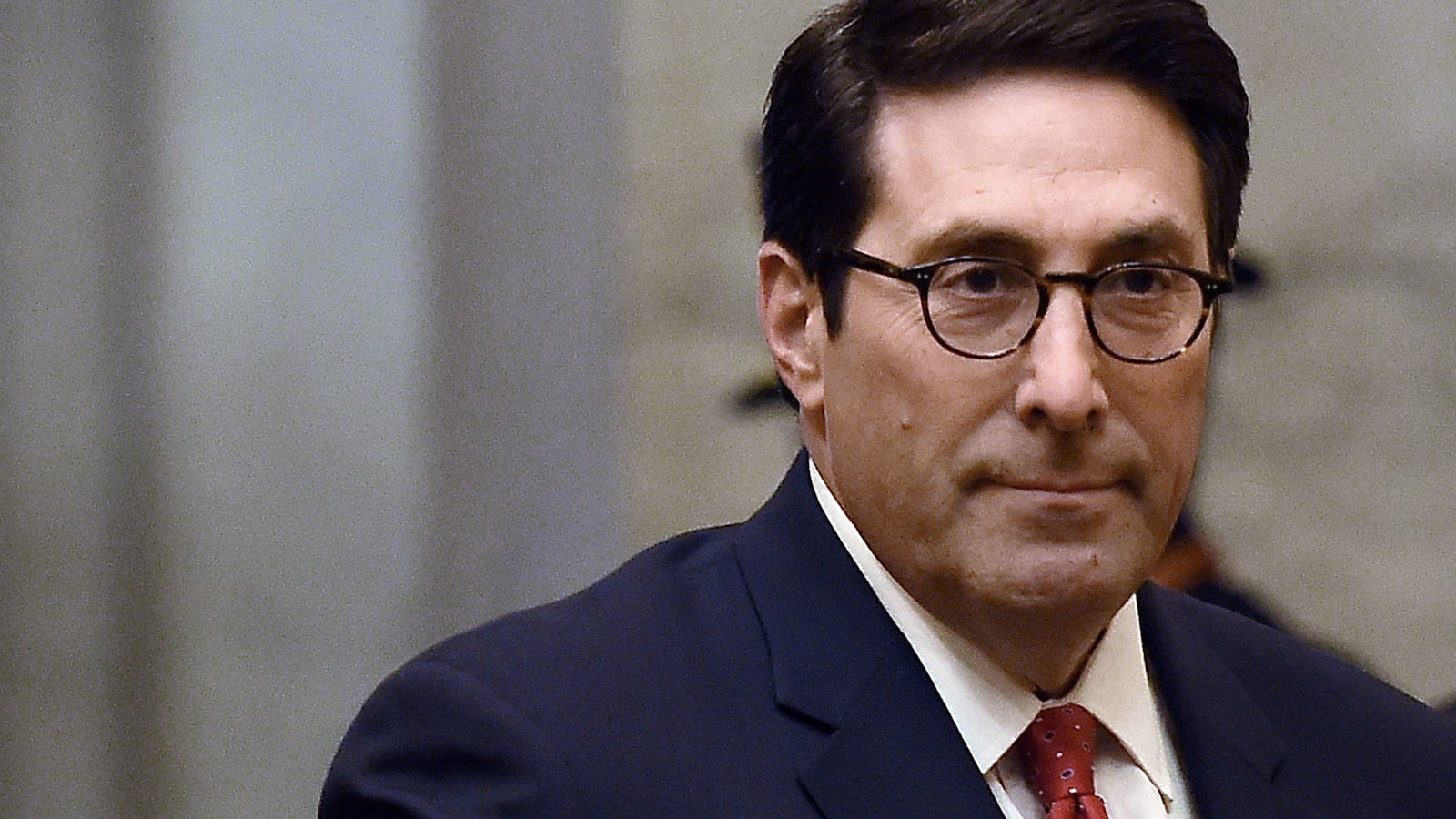As Donald Trump brags about rigging his own impeachment trial, since “Honestly, we have all the material. They don't have the material," his lawyers are lying about what impeachment is and who’s doing the rigging.
The first argument of their brief to the Senate, signed by Trump’s personal lawyer Jay Sekulow and White House Counsel Pat Cipollone, is that the impeachment lacked due process and was “rigged.” Specifically, they say on page one, “the process that brought the articles here violated every precedent and every principle of fairness followed impeachment inquiries for more than 150 years.”
Overall, in a 110 page brief, they make this claim on 43 pages (1, 4-8, 21-23, 37-42, 46-47, 53-54, 55-80). They say the “rigged” process justifies the White House’s refusal to comply with subpoenas for documents, key officials’ refusal to testify on the grounds of executive privilege, and the withholding of evidence that Trump bragged about today.
And they argue, because “The Impeachment Inquiry in the House Was Irredeemably Flawed” (p. 4), the Senate should not even rely on its results. No due process–no valid charge.
The only trouble is, this is totally false, and they know it.
The U.S. Constitution, as well as over two hundred years of settled law and tradition, is exceptionally clear: Impeachment is not a conviction. Impeachment is an indictment.
Article I, Section 2, grants the House “the sole Power of Impeachment.” And then Article I, Section 3, grants the Senate “the sole Power to try all Impeachments.”
In other words, the House acts like a prosecutor and grand jury, and the Senate acts like a court and trial jury, with the Chief Justice presiding as judge. An impeachment is not a verdict; it is a charge.
Again, this is all Constitutional Law, and Criminal Law, 101.
When a prosecutor or a grand jury is deciding whether to charge someone, the defendant doesn’t have the same due process rights that they enjoy in a criminal trial. The defendant isn’t even a defendant yet. The grand jury, if there is one, works closely with the prosecutor, something that would be outrageously improper in a trial. The attorney for the not-yet-accused may not participate at all. The rules of evidence are much more expansive than would be allowed at a trial. It’s still due process, but it’s a very different due process from that accorded to criminal defendants.
In short, the process leading to an indictment is totally different from the process leading to a conviction or acquittal. Sekulow and Cipollone’s argument is just plain wrong.
Now, is this just confusion on their part? Or perhaps a matter of interpretation?
Not a chance.
Again, none of this is ambiguous in the slightest. The House charges, the Senate convicts (or not). It’s as simple as that.
Which means that Trump’s lawyers are deliberately, brazenly mischaracterizing what impeachment means for several reasons.
First, obviously, is politics. Polls show, depressingly, that Americans have long since made up their minds about impeachment, and that their opinions almost exactly track their opinions of Donald Trump. So, even more depressingly, have nearly all U.S. senators, who despite having taken an oath to hear the case impartially, have toed their party’s lines with only a few minor deviations.
In the Republican narrative, the impeachment was a political hit-job devoid of substance or law. And saying that the process was unfair, with a pre-ordained conclusion reached by partisan inquisitors, supports that narrative.
Second, the claim that the impeachment lacked due process is at the core of Trump’s defense against the second article of impeachment, which charges him with obstruction of Congress.
Never before, not in Watergate, not in the Clinton impeachment, not ever, has a White House so boldly and completely refused to cooperate with a congressional impeachment investigation.
Indeed, as others have noted, now-Justice Brett Kavanaugh and now-Trump-lawyer Ken Starr argued in 1998 that President Clinton’s mere delay in providing information that Congress had requested was, itself, an impeachable offense. The Trump administration, in contrast, refused to provide it at all.
Indeed, had Clinton followed Trump’s example, there would have been no grounds for his impeachment, since his central offense was lying under oath when he was deposed by Starr and Kavanaugh. They set the perjury trap, and Clinton fell into it.
Trump, together with multiple White House officials, defied their subpoenas completely.
Now, in terms of realpolitik, it may not matter what rationale the White House provides for this unprecedented constitutional crisis. Fox News will parrot whatever the Trump administration says (or, in some cases, vice versa), and people will believe whatever they want to believe.
But in terms of at least providing a semblance of a legal defense in the impeachment trial, the claim that the impeachment process was an unfair hit job is at least a kind of argument. This wasn’t a fair game, Trump’s lawyers are saying, so we were right not to play it.
Again, they know that’s a lie. Everyone knows it’s a lie. But it’s a useful lie, and so they tell it again and again.
Finally, the deliberate confusion of indictment and trial helps Senate majority leader Mitch McConnell deprive the actual trial of everything a trial usually entails, like witnesses and a full body of evidence.
Indeed, based on the rules adopted on a party-line vote Wednesday, the Senate will not even subpoena the documents that the White House refused to provide to the House, such as records from the State Department, the Office of Management and Budget and the Defense Department.
Well, McConnell has said several times, the House had their chance.
Now, in any normal criminal trial, the judge and jury are presented with all the relevant evidence, not just the evidence that had been gathered by the prosecutor prior to an indictment. The very notion is preposterous.
But if the real trial already happened in the House, then the Senate trial is… what exactly? A re-trial? An appeal? I’m not really sure exactly, but it definitely isn’t a proper trial where all the evidence is admitted into the record and evaluated.
Ironically, the claim that the House “rigged” their process thus justifies McConnell’s decision to “rig” the Senate’s.
Of course, this word “rigged” was a favorite word of Donald Trump well before the impeachment drama began. Before he surprised himself by winning the 2016 election, he was already calling it “rigged.” It’s a convenient bit of rhetoric, gesturing at a conspiracy (rigged by whom?) and preemptively denying defeat.
Now, however, the word “rigged” has become a legal argument in the greatest constitutional crisis our country has ever seen. It is being used to justify a brazen defiance of the constitutional order, and to argue for a categorical rejection of articles of impeachment. It is a weapon against democracy.







